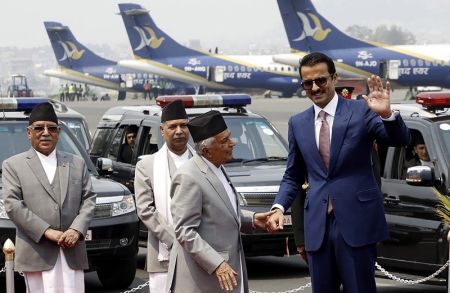On July 13 the government unveiled a Rs 618 billion annual budget for the fiscal year 2014-15 with significant investment promised in energy, infrastructure, agriculture and irrigation sectors. Finance Minister Dr Ram Sharan Mahat, who has time and again committed to kick-start second generation of economic reforms, termed the budget as reform-and investment-oriented. Though the budget has not introduced any new programmes as such and has drawn mixed reactions from experts and politicians, the minister believes that the fiscal policy will help give momentum to the sluggish national economy. Here’s an analysis by Siromani Dhungana:
.jpg) This is the first time that the government succeeded in introducing full-fledged budget on time in the last four years. The delayed implementation of the budget had resulted in economic stagnation, as economic activities could not speed up in the absence of a spur from the government, the largest spender. Though timely budget announcement this year is expected to change the scenario for the better, the journey ahead is not easy for the Finance Minister.
This is the first time that the government succeeded in introducing full-fledged budget on time in the last four years. The delayed implementation of the budget had resulted in economic stagnation, as economic activities could not speed up in the absence of a spur from the government, the largest spender. Though timely budget announcement this year is expected to change the scenario for the better, the journey ahead is not easy for the Finance Minister. Expansionary Fiscal Policy
Considering the Rs 596 billion ceiling put forward by the National Planning Commission (NPC) the budget was bigger-than-expected. The Minister crossed the recommended ceiling mostly because of two reasons. Despite his reluctance, he had to concede to the pressure of the MPs from the largest partners of the ruling coalition – Nepali Congress and CPN-UML – to earmark Rs 10 million for infrastructure project in each constituency. Next to it, the budget increased the amount of constituency development fund, provided to each of the 601 MPs for funding various development activities in their respective constituency as per their discretion, from the erstwhile Rs 1 million to Rs 1.5 million per MP. Adding to it, the budget made upward revisions in the civil servants’ salary and other perks as well.
Despite being flexible in its spending, the budget did not make any major hikes in the taxation rates. Expansionary budget, like the one under discussion, is expected to accelerate economic growth, help in employment creation and in poverty reduction. However, analysts claim that this budget comes with many risks. It may create demand pressures and fuel inflation. Analysts claim its forecast of a 8 percent inflation rate to be unrealistic.
High Hopes on policy Reforms
Hopes from the five-time Finance Minister were (and are) high among private investors and the general public. There are expectations from different quarters for tangible economic reforms that include kick-starting investment climate, improving business climate and putting the country back on a path of faster growth, as he did in 1990.
It seems he has put effort in reforming policies. “It is essential to develop the country as an attractive investment destination to achieve high, sustainable and wide economic growth. Various reform measures will be carried out in the coming Fiscal Year in order to increase domestic and foreign investment,” he said in the budget speech, which promises revision of nine major laws and policies (see table).
Financial Accountability
Emphasizing the need for making budget presentation, appropriation and implementation more responsible and accountable, the budget speech has promised formulation of the Budget Management and Financial Accountability law.
Financial accountability law is considered necessary for better governance and accountability. Such law generally includes ranges of issues including how to ensure maximum spending of the budget and what actions are to be taken against government agencies and projects that only get the budget approved without making actual spending. Similarly, the law also helps in reducing off-budget expenditure while increasing allocated resources.
Financial accountability law may help discourage the trend of allocating resources for projects, which are included in the budget under political pressure. Finance Minister has shown commitment in careful handling of public money by expressing commitment to formulate this law.
.jpg) Upbeat Private Sector
Upbeat Private Sector The main achievement of this budget announcement is that it has won back the lost confidence of the private sector. The two largest private sector umbrella organisations – Federation of Nepalese Chambers of Commerce and Industry (FNCCI) and Confederation of Nepalese Industries (CNI) – hailed the budget saying it is pro-private sector and that the government has largely addressed many demands of the private sector. Both organizations welcomed some major initiatives taken by the government such as promise to end power crisis in three years, develop infrastructure required for industrial sector, promote entrepreneurship through creation of venture fund, and build special economic zones, among others.
“The budget, which aims to lay a strong foundation for graduation of the country from the group of least developed countries to that of developing nations by 2022, has focused on development of energy and agriculture sectors, human resources and entrepreneurship, which the FNCCI admires,” FNCCI said.
Coalition Influence
In some points, the Finance Minister has deviated from his own philosophy, i.e. the notion of free market economy. He has backtracked from his earlier commitment to stop providing Rs 50 million to each of the lawmakers. He continued social security allowances without any revisions. Probably, he did not want to take risk due to fear of being unpopular. In 1990, he was assertive in implementing liberal economic policies. Now, his budget has some socialist provisions. It seems there’re tremendous changes in Dr Mahat’s working style and he is not in mood to confront opposition leaders and coalition partners.
Budget Implementation
Nepali politicians have been unpopular due to the trend of making big promises and delivering less. Despite some weaknesses, the budget has taken a positive direction but we need real action to convert intent into reality. Private sector is also cautious on this. For instance, FNCCI has said in its statement, “the business climate will definitely improve only if the programmes and reform agenda spelled out by the budget are truly implemented.” Similarly, CNI has also underlined on the need to focus on budget implementation to reap maximum benefits from the new policy and reforms announcements made by budget.
For effective implementation of this budget, this government should be able to avoid major obstacles such as political pressure and bureaucratic hurdles, among others. But the question here is: Can Dr Mahat implement the reforms promised in budget in the backdrop of these potential obstacles?
Challenge Ahead
An economist recently privately commented on the change in Dr Mahat’s work style stating, “he was more like an economist and less a politician in 1990 but now he has changed and become more like politician’. He claimed that Dr Mahat’s success would depend on his ability to confront with bureaucrats and opposition leaders and contain their unnecessary pressure. Though this will be a hard task, he will have to stand for real implementation of the budget. Former Prime Minister Dr Baburam Bhattarai expressed dissatisfaction towards the budget by claiming that instead of ‘kick-starting’, the budget will kickback the economy 20 year backwards.
Despite criticism, the budget has buoyed the private sector through its promises for much sought after economic reforms. The budget’s and by extension Dr Mahat’s promise to revive the economy will hinge on the government’s ability to create conducive environment for implementing all the promised policy reforms and to bring the private sector into confidence.





















